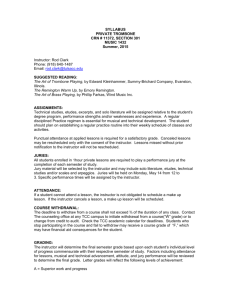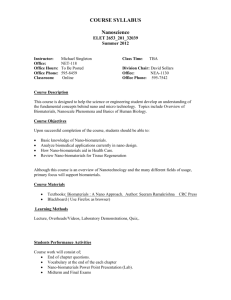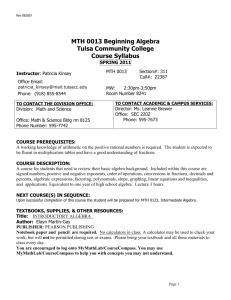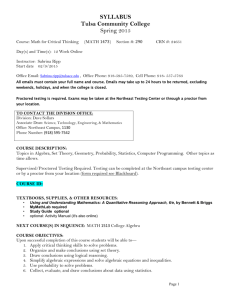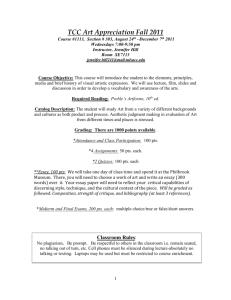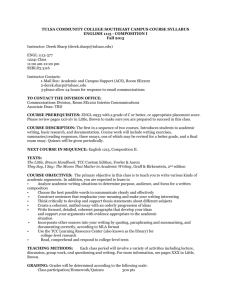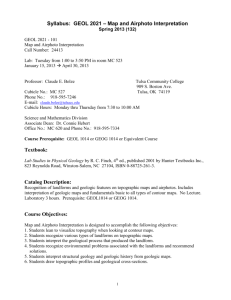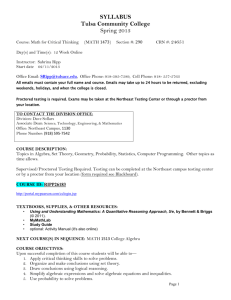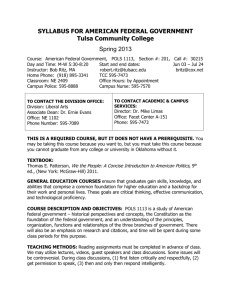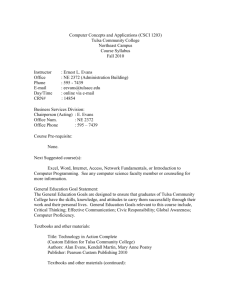HUM_2113_103_11906_201510 - Blackboard Learn
advertisement
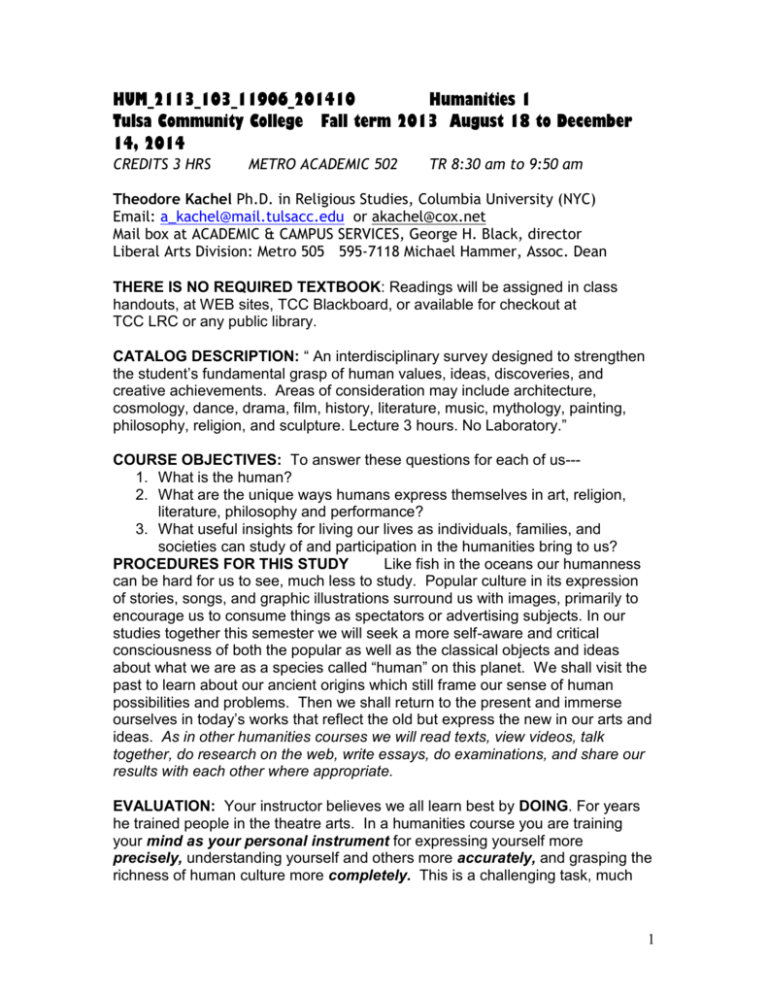
HUM_2113_103_11906_201410
Humanities 1
Tulsa Community College Fall term 2013 August 18 to December
14, 2014
CREDITS 3 HRS
METRO ACADEMIC 502
TR 8:30 am to 9:50 am
Theodore Kachel Ph.D. in Religious Studies, Columbia University (NYC)
Email: a_kachel@mail.tulsacc.edu or akachel@cox.net
Mail box at ACADEMIC & CAMPUS SERVICES, George H. Black, director
Liberal Arts Division: Metro 505 595-7118 Michael Hammer, Assoc. Dean
THERE IS NO REQUIRED TEXTBOOK: Readings will be assigned in class
handouts, at WEB sites, TCC Blackboard, or available for checkout at
TCC LRC or any public library.
CATALOG DESCRIPTION: “ An interdisciplinary survey designed to strengthen
the student’s fundamental grasp of human values, ideas, discoveries, and
creative achievements. Areas of consideration may include architecture,
cosmology, dance, drama, film, history, literature, music, mythology, painting,
philosophy, religion, and sculpture. Lecture 3 hours. No Laboratory.”
COURSE OBJECTIVES: To answer these questions for each of us--1. What is the human?
2. What are the unique ways humans express themselves in art, religion,
literature, philosophy and performance?
3. What useful insights for living our lives as individuals, families, and
societies can study of and participation in the humanities bring to us?
PROCEDURES FOR THIS STUDY
Like fish in the oceans our humanness
can be hard for us to see, much less to study. Popular culture in its expression
of stories, songs, and graphic illustrations surround us with images, primarily to
encourage us to consume things as spectators or advertising subjects. In our
studies together this semester we will seek a more self-aware and critical
consciousness of both the popular as well as the classical objects and ideas
about what we are as a species called “human” on this planet. We shall visit the
past to learn about our ancient origins which still frame our sense of human
possibilities and problems. Then we shall return to the present and immerse
ourselves in today’s works that reflect the old but express the new in our arts and
ideas. As in other humanities courses we will read texts, view videos, talk
together, do research on the web, write essays, do examinations, and share our
results with each other where appropriate.
EVALUATION: Your instructor believes we all learn best by DOING. For years
he trained people in the theatre arts. In a humanities course you are training
your mind as your personal instrument for expressing yourself more
precisely, understanding yourself and others more accurately, and grasping the
richness of human culture more completely. This is a challenging task, much
1
like an actor faces in learning to perform in theatre. It is also worth your best
effort this term.
Therefore, you shall write and present in class:
1. Three(3) brief essays on the assigned ONLINE RESEARCH topics for
a possible 300 grade points. (Essay lengths will expand from 300 words for
1st(50pts), to 600 words for 2nd(100pts), and to 900 words for the 3rd(150pts) for
a total possible 300 points.. You shall do:
2. Three(3) in-class essay & short-answer definitions exams over
your readings. Each is cumulative in scope for all the readings done by the date
of that examination. They will vary in examination time from ONE Hour for the
first and second, and then One & Half Hour at the course’s FINAL EXAM
MEETING. The first and second exams are for 100 grade points each, and the
final exam is for 200 grade points, making the TOTAL examination points
possible 400 points.
You shall do also:
3. One(1) outside of class research project comparing and
contrasting a contemporary cultural art form or intellectual movement with
one of the older traditional ones we have studied earlier in this course.
This may be based upon your review of an instructor approved book, fiction or
non-fiction, or by some other means for participant observation of an artistic
group, movement, concert, exhibit or the viewing of films or television programs
approved by instructor as relevant to our study. You can earn up to 200 points
toward your final grade by completion of this project.
4. Perfect class attendance is worth 100 grade points. Attendance is
recorded at each class with a sign-in sheet. Grade points are then figured on the
percentage of your attendance for the whole term.
Final letter grade scale is:
A
1000 to 900 points
B
899 to 800 points
C
799 to 650 points
D
649 to 550 points
F
549 or less points.
INSTRUCTOR’S EXPECTATIONS OF STUDENT PERFORMANCE
You are adults now; if you are not only to survive but prosper in this world
you find yourself born into, you will need to learn to treat others with alert and
charming respect. Competition can help you sharpen your skills, but cooperation
in creating constructive, creative, and supportive surroundings at work, at school,
at home, and at play is of the essence of humane life. If we were a cast and
crew of theatre artists preparing for a public performance of a play, we would all
naturally realize that we should “hang together for each other” or we will surely
“each hang separately as fools in public.” I expect no less of you in my class,
and in the work you submit for my consideration. If you are late with an
assignment after one week from its due date you lose those grade points. If
you miss an in-class examination, make arrangements with me to finish it
within the week from its date, or you lose those grade points. If for any
2
reason or no reason at all, you quit attending class, please drop this course
officially on or before Friday, NOVEMBER 7, 2014, to avoid a failing grade.
3
Tobacco Free College
Tulsa Community College is a Tobacco Free college in accordance with the
Governor’s Executive Order 2012-01 and Title 63 of the Oklahoma Statutes,
Section 1-1523 which prohibits smoking or the use of any tobacco
products in all public places, in any indoor workplace, and all vehicles
owned by the State of Oklahoma and all of its agencies and
instrumentalities. This Order includes property leased, rented, or owned
by TCC including, but not limited to, all grounds, buildings, facilities, and
parking lots. Tulsa Community College’s policy includes a tobacco free
environment on all campus and off-campus locations conducting TCC
credit or non-credit classes. The TCC Campus Police is responsible for
ensuring compliance with the Tobacco-Free Environment
Policy. Violations of the policy may be addressed through issuance of
campus or state citations.
Additional TCC Official Policy statements required for all course syllabuses
are:
10. Course Withdrawal: The deadline to withdraw from a course shall not
exceed 3/4 the duration of any class. Contact the Counseling Office at any TCC
campus to initiate withdrawal from a course ('W' grade) or to change from Credit
to Audit. Check the TCC Academic Calendar for deadlines. Students who stop
participating in the course and fail to withdraw may receive a course grade of “F,”
which may have financial aid consequences for the student.
11. Communications:
a. Email communications: All TCC students receive a designated
“MyTCC” email address (ex: jane_doe@mail.tulsacc.edu). All
communications to you about TCC and course assignments will be
sent to your MyTCC email address; and you must use MyTCC email to
send email to, and receive email from, the instructor regarding this
course.
b. Inclement Weather: TCC rarely closes. If extreme weather conditions
or emergency situations arise, TCC always gives cancellation notices
to radio and television stations. This information is also posted on the
TCC website (www.tulsacc.edu).
12. General Education Goals: General Education courses at TCC ensure that
our graduates gain skills, knowledge, and abilities that comprise a common
foundation for their higher education and a backdrop for their work and
personal lives. TCC’s General Education goals are: Critical Thinking, Effective
Communication, Engaged Learning, and Technological Proficiency.
13. Classroom Etiquette: Open and mutually respectful communication of
varied opinions, beliefs, and perspectives during classroom or online
discussion encourages the free exchange of ideas that is essential to higher
learning and to the ability to learn from each other. Use of any electronic
device is at the discretion of the instructor.
14. Syllabus Changes: Occasionally, changes to the syllabus may be
necessary. Students will be notified of any changes to the syllabus in writing.
4
15. DISABILITY RESOURCES: It is the policy and practice of Tulsa
Community College to create inclusive learning environments.
Accommodations for qualifying students in compliance with the Americans
with Disabilities Act (ADA) and Section 504 of the Rehabilitation Act are
available. To request accommodations, contact the Education Access Center
(EAC) at eac@tulsacc.edu or call (918) 595-7115 (Voice). Deaf and hard of
hearing students may text (918) 809-1864.
16. Academic Dishonesty: Academic dishonesty (cheating) is defined as the
deception of others about one’s own work or about the work of another.
Academic dishonesty or misconduct is not condoned or tolerated at
campuses within the Tulsa Community College system. Tulsa Community
College adopts a policy delegating certain forms of authority for disciplinary
action to the faculty. Such disciplinary actions delegated to the faculty include,
but are not limited to, the dismissal of disrespectful or disorderly students
from classes. In the case of academic dishonesty a faculty member may:
require the student to redo an assignment or test, or require the student to
complete a substitute assignment or test;
Record a "zero" for the assignment or test in question;
Recommend to the student that the student withdraw from the class, or
administratively withdraw the student from the class;
Record a grade of "F" for the student at the end of the semester.
Faculty may request that disciplinary action be taken against a student at the
administrative level by submitting such request to the Dean of Student
Services.
17. Institutional Statement: Each student is responsible for being aware of the
information contained in the TCC Catalog, the TCC Student Policies &
Resources Handbook, and
semester information listed in the class schedule. All information may be
viewed on the TCC website: www.tulsacc.edu.”
5

